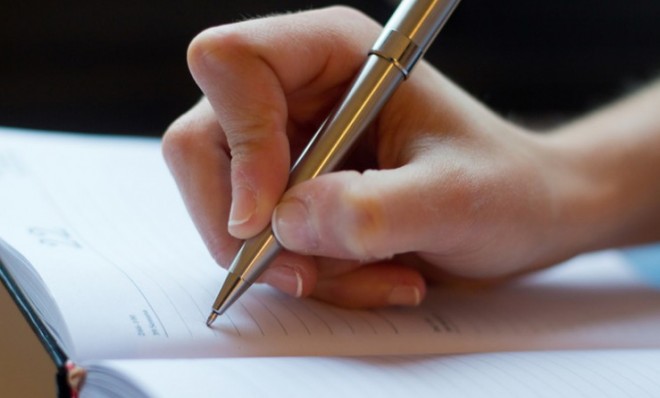4 benefits of writing by hand
Scientists and famous authors like Truman Capote agree: Handwriting may be a lost art, but it's still an invaluable skill

Like millions of other people who have spent the better part of the past decade tapping at a keyboard, swiping various screens, and staring into a monitor of one kind or another, my handwriting has slowly mutated into a vaguely familiar assemblage of sticks and circles that, on a good day, might be able to pass for a third grader's. And cursive? You'd be better off asking me to blindly draw a series of puzzling loops, not unlike the John Hancock of a certain Treasury secretary nominee. "Let's face it: Cultivating fine handwriting is now an indulgence, a hobby for the minded, like knitting, or decoupage," argues Julia Turner at Slate. "Our children must learn to write in school — but they probably don't need to write that well."
There's evidence, however, that writing the old-fashioned way is really good for us. Here, in no particular order, are four ways handwriting is still helpful:
1. It's better for learning
The Week
Escape your echo chamber. Get the facts behind the news, plus analysis from multiple perspectives.

Sign up for The Week's Free Newsletters
From our morning news briefing to a weekly Good News Newsletter, get the best of The Week delivered directly to your inbox.
From our morning news briefing to a weekly Good News Newsletter, get the best of The Week delivered directly to your inbox.
One of the most effective ways to study and retain new information is to rewrite your notes by hand. That's because putting ink to paper stimulates a part of the brain called the Reticular Activating Center, or the RAS. According to Lifehacker, "The RAS acts as a filter for everything your brain needs to process, giving more importance to the stuff that you're actively focusing on that moment — something that the physical act of writing brings to the forefront." One study from 2010 found that the brain areas associated with learning "lit up" much more when kids were asked to write words like "spaceship" by hand versus just studying the word closely.
2. It makes you a better writer
Many famous authors opt for the meticulousness of writing by hand over the utility of a typewriter or computer. In a 1995 interview with the Paris Review, writer Susan Sontag said that she penned her first drafts the analog way before typing them up for editing later. "I write with a felt-tip pen, or sometimes a pencil, on yellow or white legal pads, that fetish of American writers," she said. "I like the slowness of writing by hand." Novelist Truman Capote insisted on a similar process, although his involved lying down with a coffee and cigarette nearby. "No, I don't use a typewriter," he said in an interview. "Not in the beginning. I write my first version in longhand (pencil). Then I do a complete revision, also in longhand." A 2009 study from the University of Washington seems to support Sontag, Capote, and many other writers' preference for writing by hand: Elementary school students who wrote essays with a pen not only wrote more than their keyboard-tapping peers, but they also wrote faster and in more complete sentences.
3. It will prevent you from being distracted
A free daily email with the biggest news stories of the day – and the best features from TheWeek.com
The computer in front of you is a time-sucking portal to puppy videos and ex-boyfriend/girlfriend stalking. That's why self-imposed lockout programs like Facebook Limiter and Minutes Please exist in the first place. Of course, the internet isn't all bad. In 2012, neuroscientists even suggested that taking five-minute breaks to browse Tumblr or BuzzFeed could make you a more productive worker. On the other hand, when you're all GIF'd-out and it's time to work on that dissertation, there's something to be said for the elegant simplicity of having only a pen and paper in front of you... especially since that paper probably isn't plugged into the distraction-laden internet. Try writing with laser-like focus for short 20-minute stretches at a time.
4. It keeps your brain sharp as you get older
Writing longhand is a workout. No, not necessarily for your wrist, but for your brain. According to The Wall Street Journal, some physicians claim that the act of writing — which engages your motor-skills, memory, and more — is good cognitive exercise for baby boomers who want to keep their minds sharp as they age. And if you're looking to pick up a new skill, a 2008 study published in the Journal of Cognitive Neuroscience found that adults had an easier time recognizing new characters — like Chinese, math symbols, or music notes — that were written by hand over characters generated by a computer.
-
 Nasa’s new dark matter map
Nasa’s new dark matter mapUnder the Radar High-resolution images may help scientists understand the ‘gravitational scaffolding into which everything else falls and is built into galaxies’
-
 Is the US about to lose its measles elimination status?
Is the US about to lose its measles elimination status?Today's Big Question Cases are skyrocketing
-
 ‘No one is exempt from responsibility, and especially not elite sport circuits’
‘No one is exempt from responsibility, and especially not elite sport circuits’Instant Opinion Opinion, comment and editorials of the day